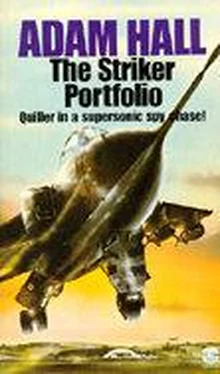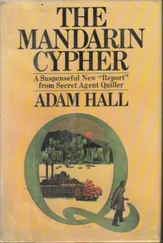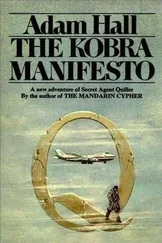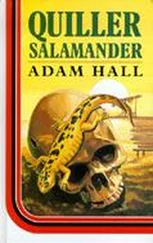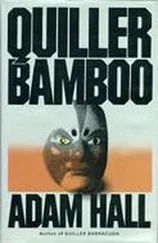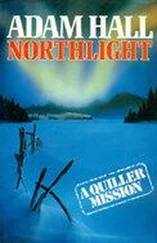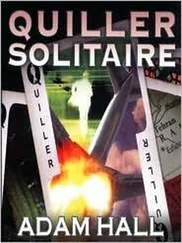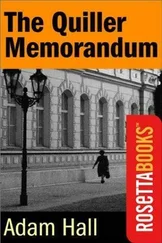My chances were those of any candidate in an exam: they could ask the right questions (the ones I could answer) or the wrong ones (the ones I couldn't).
Light was spreading again. Someone else was closing on us from along the autobahn. I hardly noticed. I hardly noticed because the whole situation was presenting itself logically in my mind, perhaps as an antidote to fright. It went like this: Ferris would already be in signals with London and as long as the Bureau thought I was still of use they would move all available mountains to help get the Kriminalpolizei off my back. They had set me running and they wanted me to go on running in case by luck or acumen I found my way finally into what Parkis called the storm-centre. (There's an appalling amount of luck in the conduct of any mission however much acumen you try to bring it to: witness the collapse of Benedikt at a critical phase.) Of course the Bureau could do nothing officially: it didn't exist. But no network on a world scale is ever isolated: there's always a fringe overlap especially when something big is on the programme and any given agency will bump elbows with most organizations from the national civil police authorities up through the C.I.D. Special Branch, M.I.5., M.I.6. and the various select departments whose chiefs are known only to the P.M. and the Home Secretary. On an overseas mission you won't get far before you cross lines with the S.I.D., the C.I.A. or the Deuxieme Bureau according to the area being worked. Interpol will often come into the picture because it has ninety-eight member-countries and that doesn't leave many places where they don't operate. (Interpol would at this moment see the name Martin coming up on their alert-programme because he was a British national in a foreign country and their main concern is with people crossing frontiers.) Unofficially the Bureau would tap the odd grapevine here and there until they got a response from some organization they happened to have assisted at some time or other and if they could ease the right word through to Kriminalpolizei, Bundesrepublik Deutschland, a few telephones would ring and the heat would come off Martin even if he were being grilled in a cell on a murder charge.
But there was a limit to what action the Bureau could take and that limit was the line beyond which the Bureau would risk self-exposure. Of the sacred and unwritten laws that governed its constitution the most holy was that no one, however high, must in any circumstances, however grave, ever by word or deed or implication jeopardize the prime virtue by grace of which the Bureau was enabled to operate in areas and with resources outside the reach of other factions: the virtue of non-existence. Among the lower echelons where the ferrets ran we called it the Rule of the D.T.M.: otherwise Don't Tell Mum.
So the Bureau had a limit and so had I and it was the same one, the same precisely defined invisible line: because if these people asked to see the car papers or asked me to get out and open j the luggage-boot and it led to a cell and a charge and a trial I! would have to deal with it alone. From the moment of an official charge the Bureau would drop me like a dead rat. That was all right: it was in the contract. But my defence would already be spiked. To prove I hadn't killed Benedikt I would have to answer every question put by the prosecution and there'd be some I couldn't answer because it would mean crossing the line, exposing the Bureau.
When did you join the Accidents Investigation Branch of the Air Ministry, Herr Martin? What were you doing before then? Where did you train as an aviation psychologist? You can't answer? But surely you can tell us about your past? Your background? You'll be telling us next, Herr Martin, that you don't exist? Correct.
They'd have it made. Acquaintance with the deceased — absence of alibi — fingerprints on the deceased's watch, lighter, pens — hasty departure from the motel — failure to complete accident report at hospital — acquisition of false papers — attempt to pass through police block under assumed identity. And finally the.refusal to answer questions in court.
They don't hang you in West Germany these days. It would be a life sentence. But that wasn't the worst. Appeal. Tell them to look for the two men: the ones the manager saw with the deceased. If that was no use then I could stick it out till a chance came and I had a hacksaw blade and if the chance didn't come I could try to make a break from a working-party and if I couldn't make a break I could use a dinner-knife on the wrists and cut the rest of the sentence away. But all the time I was waiting for chances in there like a tethered goat I'd have to live with the thought that the Bureau was still running and the missions were still going out and there was one I hadn't finished. This one. That was the worst.
The flood of light grew brighter from behind and the shadow of the man with the signal-lamp moved sharply across the road. I tucked my papers away and looked up at the officer to see if that was all.
He said: 'Please open your luggage compartment.' He stood away from the door to give me room to get out.
Chapter Twelve — TO GROUND
The body of Homo is provided with various compensatory mechanisms. One is the carotid sinus, located in the neck.
'Zu gross.'
'Sind Sie sicker?'
When a man becomes angry the released adrenalin raises his blood-pressure throughout the system, putting incidental pressure on the carotid sinus. This triggers off a flow of nerve impulses to the brain which produce a calming effect in compensation. That is why the most heated anger cools the most quickly.
'Probieren Sie diese an'
I put them on and walked round. They were unpolished stag-skin, high at the sides. The serration on the soles was only half-worn and they were dead quiet on the floor: that was important.
'Ja, die passeri?
The place was stuffed to the rafters with masculine accessories: shot-guns, fishing-rods, field-glasses, skis, windbreakers, boots and shoes. High in the gloom there was a diver's helmet. On his desk was a quarryman's detonator. It was a pity that I needed only shoes. You can do a lot with a quarryman's detonator.
'Tragen Sie die gleich?'
'Ja.'
They had buckles instead of laces and I took them up a notch. I was pleased with them, certainly not angry, but the carotid sinus works also in reverse. Low barometric pressure outside has the same effect as high blood-pressure inside. Since it can't tell the difference it sends the same nerve impulses to the brain, calming it down. Some people say: 'I'm sleepy, it must be the weather.'
He looked at my split shoe with a shrug.
'Fertig.'
'Fertig.' I nodded.
He dropped them both into an upturned fencing-mask and I gave him 60 DM, 20 for the shoes and 40 for the pair of x6 Zeiss I had found on a shelf. He counted the deutschmarks in the light from the doorway. Over the Harz range the sky was a purple bruise. It was going to be a spectacular storm when it came, and this was why I felt sleepy.
Or it was the after-effects of the crash or the inadequate sleep at Nitri's or the nervous tension of the police trap. Or I was getting old.
'Auf Wiedersehen.'
I went back to the car, walking normally for the first time since I'd left the motel. The left shoe felt too tight but it had two notches on each buckle the same as the other one: the foot had already tried to adapt itself to a split upper and now it would have to relearn.
'Certainly,' I had said, but it had been a nasty five minutes. The air was cold so I made a show of feeling the contrast, blowing out my cheeks as I left the car, one hand in my pocket for warmth, the other finding the right key as though it didn't have to think about it but it had to think about it bloody hard because it wasn't far from the driving-door to the boot and I was doing it one-handed and they were watching me and I knew that.
Читать дальше
